| (insert your NIE or newspaper logo here) |
Weekly Online LessonOnline Lesson ArchiveGrade Level: 7-12
|
Power Failure
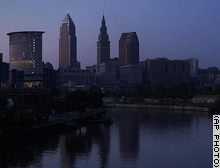 The
northeastern region got a shock last Thursday, August 14, 2003, when
the biggest power outage in U.S. history affected more than 50 million
people in eight states and the Canadian province of Ontario.
The
northeastern region got a shock last Thursday, August 14, 2003, when
the biggest power outage in U.S. history affected more than 50 million
people in eight states and the Canadian province of Ontario.
The trouble apparently began around 2 p.m. EDT, when a 680-megawatt coal-generation plant in Eastlake, Ohio, near Cleveland, tripped out of service. Though that wasn't unusual, particularly during the hot summer, it somehow affected the whole power grid, cascading into a regional blackout by 4 p.m.
A power grid is composed of three distinct parts: power plants, high voltage lines that carry electricity across vast distances, and a distribution network that moves power from high voltage lines to homes and businesses.
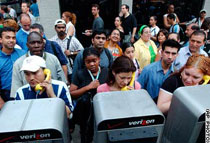 With
the grid offline, people were literally powerless for hours, ranging
from about two hours in some areas of Ohio to 36 hours in New York City
and up to 40 hours in parts of Toronto. Commuters were stranded, cell
phones failed, refrigerators warmed, and raw sewage spilled into waterways
untreated. Although power has generally been restored, most places are
still recovering from the consequences the incident created.
With
the grid offline, people were literally powerless for hours, ranging
from about two hours in some areas of Ohio to 36 hours in New York City
and up to 40 hours in parts of Toronto. Commuters were stranded, cell
phones failed, refrigerators warmed, and raw sewage spilled into waterways
untreated. Although power has generally been restored, most places are
still recovering from the consequences the incident created.
What exactly happened is still being investigated, but the incident has already generated discussion over energy distribution. Some experts say the root of the blackout is based in a combination of conditions: an aging transmission system, energy deregulation — which has allowed dozens of new power suppliers to hook into the grid, and increasing interconnectivity between utilities from the East Coast to the Rocky Mountains.
Since our society depends heavily on reliable electricity, this week you'll investigate the power of the grid and how blackouts happen.
The Power Grid
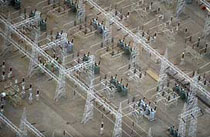 For
this lesson, you'll be spending most of your time at HowStuffWorks,
starting with How
Power Grids Work. Read the introduction then hit Next
Page to find out how It
All Starts at the Power Plant.
For
this lesson, you'll be spending most of your time at HowStuffWorks,
starting with How
Power Grids Work. Read the introduction then hit Next
Page to find out how It
All Starts at the Power Plant.
What are a few of the ways that a generator can spin? How is power generated in your region? What's the difference between AC and DC current? Which one do power distribution grids use and why? What's the significance of 3-phase power?
On the next page, find out more about The Distribution Grid and Distribution Bus. What exactly is the function of a substation? Why is that function important to people who use the electricity? How far away are power plants and substations from your home or school?
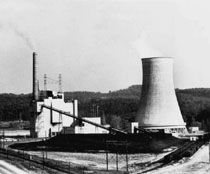 Keep
moving through the pages and read about Regulator
Banks, Taps,
and what happens At
the House.
Keep
moving through the pages and read about Regulator
Banks, Taps,
and what happens At
the House.
What does a transformer do? Have you ever seen a transformer on the ground or on a pole around your own neighborhood?
Make sure to also check out the last page in this section on Fuses and Circuit Breakers. How exactly do these safety measures protect people from injury or property damage when tapping into the power grid? Review how the system works from power plant to household. What problems could occur at each step along the way that would affect the distribution of electricity?
How Blackouts Work
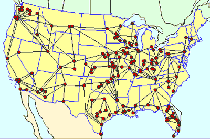 Continue
your exploration at HowStuffWorks at their related site, How
Blackouts Work. Read the page to find out why balance between
consumer demand and power production is important. What are the advantages
and disadvantages of the system's interconnectedness?
Continue
your exploration at HowStuffWorks at their related site, How
Blackouts Work. Read the page to find out why balance between
consumer demand and power production is important. What are the advantages
and disadvantages of the system's interconnectedness?
Browse the list of Big Blackouts in U.S. History, which will take you to off-site resources that explain how they happened and what the consequences were. Open these in new browser windows or click your browser's Back button to return to the How Blackouts Work site.
Spend some extra time at one of those off-site resources, The Blackout History Project. Review the Timeline to check out some significant power-related events from 1950 to 1979. You can also read some of the Stories of those who experienced blackouts and the Highlights of how these events affected the electric utilities industry. The Perspectives section provides essays on what lessons the industry learned and how they influenced historical economic, political and social changes.
In what ways do you think the recent blackout is similar to these earlier events? In what ways are they different? How do you think last week's power outage might affect the electric utilities industry, particularly deregulation, and consumers? Could advances in technology improve the system to better prevent such blackouts? How would your life be different without electricity?
Newspaper Activities
In a current issue of Targetnewspaper find stories about how people, cities, government agencies and utilities are still recovering from or responding to last week's blackout. What were some of the economic losses from the event? What are electric companies doing to ensure such a large-scale outage doesn't happen again? Are people doing anything differently to prepare for a similar incident in the future? Are state or federal agents proposing changes to power regulation or distribution? Whether your neighborhood was directly affected by this blackout or not, in what ways is your local community, including your government, responding to this event and why? Have you ever experienced power outages in your home or school? If so, what exactly was the cause and how long did it take to fix?
© Copyright 2003
Learners Online, Inc.
